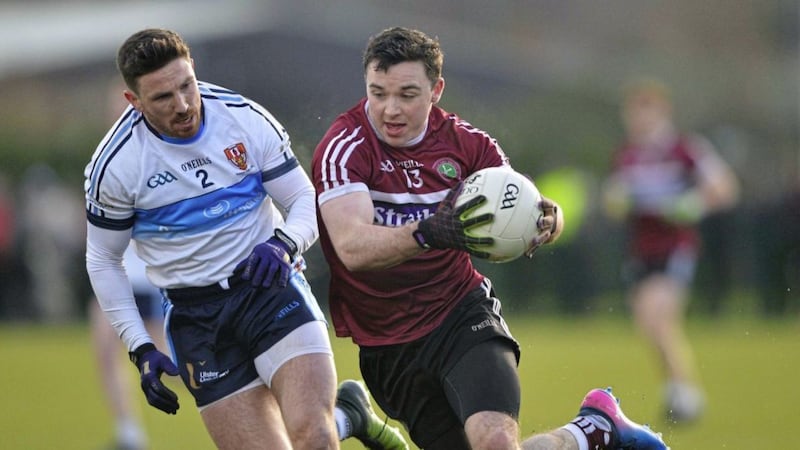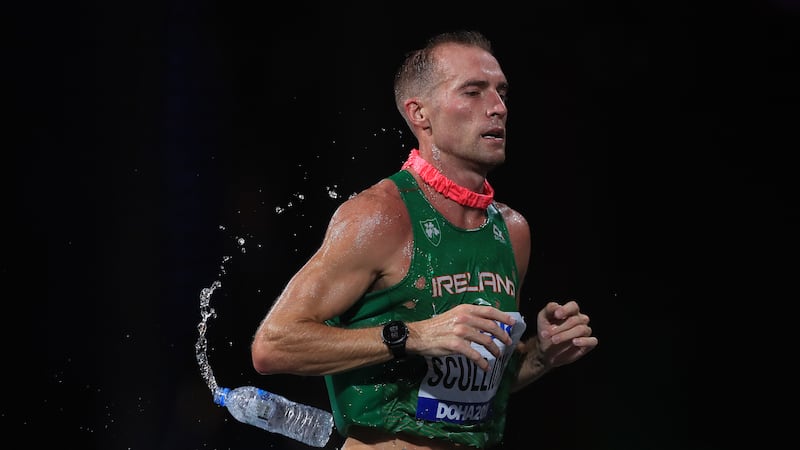MY post-match interview with an Ulster University player was roughly 15 seconds old when their manager Paul Rouse insisted it be terminated.
The students had just lost their final Dr McKenna Cup group game to Down in Burren. All the players and backroom staff went into the changing room and closed the door behind them.
I waited outside the UU changing room for 10 minutes with no great expectation of resuming the interview or asking Rouse for his reflections.
The changing room door eventually opened and it was confirmed there would be no interviews taking place.
The same thing happened at a bitterly cold Woodlands Park on Wednesday afternoon after Rouse had guided UU to a brilliant Sigerson Cup win over St Mary’s.
My colleague Cahair O’Kane was getting the thoughts of another Ulster University player before the manager insisted the interview be terminated.
Thankfully, these kinds of situations don’t happen too often. When they do occur it’s invariably undignified and embarrassing for both the player and journalist.
I often think what harm could a player say or do after winning a game of football?
This is a third level competition. These players are educated, intelligent individuals.
But when it comes to the media, sometimes the players are treated like serfs.
I don’t know Paul Rouse and I wouldn’t rush to judge him.
In fact, I’ve heard very complimentary things about him as a football manager.
He may have his reasons for not allowing his players to interact with the media. Maybe it's superstition. Maybe there was an offending article.
If there is a reason it was never communicated.
Afterwards, Cahair tweeted that it was disappointing the UU players were banned from speaking with the press, adding: “It’s a competition in need of all the promotion it gets as far as I see.”
This blanket post-match ban approach was hard to fathom given the tireless promotional work of Tommy Joe Farrell, a stalwart of the Ulster University GAA club for umpteen years.
It’s exactly the same at Queen’s University where Aidan O’Rourke and others ceaselessly promote Gaelic Games through the local media.
Likewise, St Mary’s.
The Ulster U21 Football Championship may have been erased from the calendar, which relieves a bit of pressure on the third level sector, but they’re still competing in a crowded market and are in danger of being swallowed up by the recently condensed NFL and NHL schedules.
Gaelic Games are nothing without the players. They are and always will be the association’s greatest asset.
Why burrow them away from the media spotlight?
It’s not just managers who terminate interviews that are the problem; the GAA’s over-arching approach to media relations is deeply flawed.
In the last number of years, a thick layer of bureaucracy has sprouted up, which singularly makes life more difficult for the media to present the games.
The media are inundated with press briefings throughout the inter-county season.
Some would call this streamlining media relations. Others would call it controlling media relations.
Like sheep, sports reporters turn up to these events and regularly feed off exactly the same quotes.
In turn, these quotes are mass produced in the following day’s newspapers.
The whole press briefing process has become desperately homogenised.
Naturally enough, GAA sponsors are inclined to want the game's big-hitters to attend these events.
And that’s when the media-training kicks in.
A load of anodyne quotes are typed up and consequently a load of anodyne interviews are packaged and presented to the reader.
Because of this stream-lined approach to media relations, GAA players are inclined to surrender another piece of centre stage with each passing season, which is instantly colonised by pundits and ex-players who generally add a bit of colour and some noise.
Another knock-on effect is that the vast majority of players on panels receive very little media exposure, and they never get the chance to leave a bit of archive during their playing careers that they can maybe look back on with some pride.
Journalism is a tough industry these days.
It’s virtually unrecognisable from the early tentative steps I took in the profession back in 1999.
Click bait constantly drones in the background and annoys many of us within the industry. And the mainstream media is not without its faults either.
Thankfully, those of us in The Irish News sports department are still afforded the greatest, untouchable resource a journalist can ever have: time.
In this 24/7 media age, we still have time to research, time to compile information, time to think and time to meet players and coaches outside of ‘greenhouse’ press briefings – to tell their back stories.
Upon announcing his semi-retirement two years ago, the peerless Hugh McIlvaney wrote: “Of all the changes that have transformed my trade since I arrived in Fleet Street half a century ago, obviously the most revolutionising has been the explosion of technology. But of no less interest to me is the shrinkage of meaningful access.”
Without “meaningful access”, the GAA will end up with no back stories to tell and no colour.
Its undoubted richness will never be explored.
The presentation of Gaelic Games will become bland, if it hasn’t done so in parts already.
And so journalists and the game’s sponsored big-hitters will sleep-walk into the future together, hand-in-hand, media-trained and soon to be demoralised by the entire process.
After a while nobody in our industry will care to look beyond the surface or beyond the next press briefing.
Over the last few years, GAA players have been eased off the stage which is rightfully theirs. And that's a sad thing.








